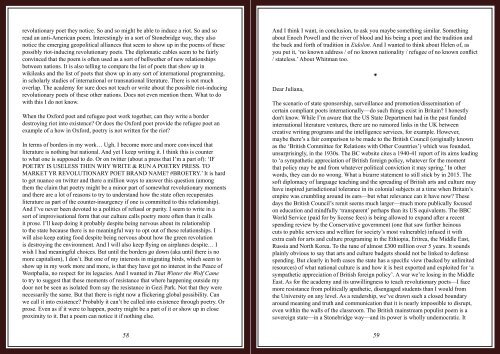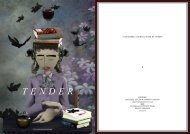t e n d e r
tender-seven
tender-seven
Create successful ePaper yourself
Turn your PDF publications into a flip-book with our unique Google optimized e-Paper software.
evolutionary poet they notice. So and so might be able to induce a riot. So and so<br />
read an anti-American poem. Interestingly in a sort of Stonebridge way, they also<br />
notice the emerging geopolitical alliances that seem to show up in the poems of these<br />
possibly riot-inducing revolutionary poets. The diplomatic cables seem to be fairly<br />
convinced that the poem is often used as a sort of bellwether of new relationships<br />
between nations. It is also telling to compare the list of poets that show up in<br />
wikileaks and the list of poets that show up in any sort of international programming,<br />
in scholarly studies of international or transnational literature. There is not much<br />
overlap. The academy for sure does not teach or write about the possible riot-inducing<br />
revolutionary poets of these other nations. Does not even mention them. What to do<br />
with this I do not know.<br />
When the Oxford poet and refugee poet work together, can they write a border<br />
destroying riot into existence? Or does the Oxford poet provide the refugee poet an<br />
example of a how in Oxford, poetry is not written for the riot?<br />
In terms of borders in my work… Ugh. I become more and more convinced that<br />
literature is nothing but national. And yet I keep writing it. I think this is counter<br />
to what one is supposed to do. Or on twitter (about a press that I’m a part of): ‘IF<br />
POETRY IS USELESS THEN WHY WRITE & RUN A POETRY PRESS. TO<br />
MARKET YR REVOLUTIONARY POET BRAND NAME? #BROETRY.’ It is hard<br />
to get nuance on twitter and there a million ways to answer this question (among<br />
them the claim that poetry might be a minor part of somewhat revolutionary moments<br />
and there are a lot of reasons to try to understand how the state often recuperates<br />
literature as part of the counter-insurgency if one is committed to this relationship).<br />
And I’ve never been devoted to a politics of refusal or purity. I seem to write in a<br />
sort of improvisational form that our culture calls poetry more often than it calls<br />
it prose. I’ll keep doing it probably despite being nervous about its relationship<br />
to the state because there is no meaningful way to opt out of these relationships. I<br />
will also keep eating food despite being nervous about how the green revolution<br />
is destroying the environment. And I will also keep flying on airplanes despite… I<br />
wish I had meaningful choices. But until the borders go down (aka until there is no<br />
more capitalism), I don’t. But one of my interests in migrating birds, which seem to<br />
show up in my work more and more, is that they have got no interest in the Peace of<br />
Westphalia, no respect for its legacies. And I wanted in That Winter the Wolf Came<br />
to try to suggest that these moments of resistance that where happening outside my<br />
door not be seen as isolated from say the resistance in Gezi Park. Not that they were<br />
necessarily the same. But that there is right now a flickering global possibility. Can<br />
we call it into existence? Probably it can’t be called into existence through poetry. Or<br />
prose. Even as if it were to happen, poetry might be a part of it or show up in close<br />
proximity to it. But a poem can notice it if nothing else.<br />
And I think I want, in conclusion, to ask you maybe something similar. Something<br />
about Enoch Powell and the river of blood and his being a poet and the tradition and<br />
the back and forth of tradition in Eidolon. And I wanted to think about Helen of, as<br />
you put it, ‘no known address / of no known nationality / refugee of no known conflict<br />
/ stateless.’ About Whitman too.<br />
Dear Juliana,<br />
✴<br />
The scenario of state sponsorship, surveillance and promotion/dissemination of<br />
certain compliant poets internationally—do such things exist in Britain? I honestly<br />
don't know. While I’m aware that the US State Department had in the past funded<br />
international literature ventures, there are no rumored links in the UK between<br />
creative writing programs and the intelligence services, for example. However,<br />
maybe there’s a fair comparison to be made to the British Council (originally known<br />
as the ‘British Committee for Relations with Other Countries’) which was founded,<br />
unsurprisingly, in the 1930s. The BC website cites a 1940-41 report of its aims leading<br />
to ‘a sympathetic appreciation of British foreign policy, whatever for the moment<br />
that policy may be and from whatever political conviction it may spring.’ In other<br />
words, they can do no wrong. What a bizarre statement to still stick by in 2015. The<br />
soft diplomacy of language teaching and the spreading of British arts and culture may<br />
have inspired jurisdictional tolerance in its colonial subjects at a time when Britain’s<br />
empire was crumbling around its ears—but what relevance can it have now? These<br />
days the British Council’s remit seems much larger—much more publically focused<br />
on education and mindfully ‘transparent’ perhaps than its US equivalents. The BBC<br />
World Service (paid for by license fees) is being allowed to expand after a recent<br />
spending review by the Conservative government (one that saw further heinous<br />
cuts to public services and welfare for society’s most vulnerable) infused it with<br />
extra cash for arts and culture programing in the Ethiopia, Eritrea, the Middle East,<br />
Russia and North Korea. To the tune of almost £300 million over 5 years. It sounds<br />
plainly obvious to say that arts and culture budgets should not be linked to defense<br />
spending. But clearly in both cases the state has a specific view (backed by unlimited<br />
resources) of what national culture is and how it is best exported and exploited for ‘a<br />
sympathetic appreciation of British foreign policy’. A war we’re losing in the Middle<br />
East. As for the academy and its unwillingness to teach revolutionary poets—I face<br />
more resistance from politically apathetic, disengaged students than I would from<br />
the University on any level. As a readership, we’ve drawn such a closed boundary<br />
around meaning and truth and communication that it is nearly impossible to disrupt,<br />
even within the walls of the classroom. The British mainstream populist poem is a<br />
sovereign state—in a Stonebridge way—and its power is wholly undemocratic. It<br />
58 59




